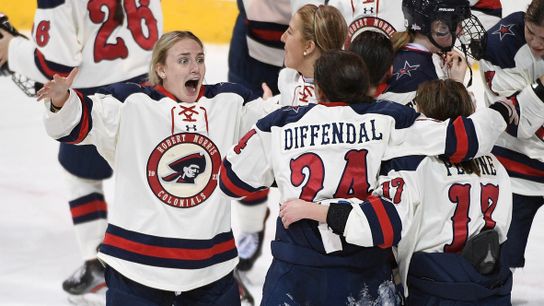ALTOONA, Pa. -- In his first public speaking since Robert Morris stunningly eliminated the men's and women's hockey programs, school president Chris Howard on Tuesday afternoon confirmed the exclusive reporting of DK Pittsburgh Sports earlier in the day that there was, in fact, no vote conducted by the Board of Trustees.
He claimed, instead, that the Trustees achieved a "consensus" after the decision had already been made, and he declined to define what "consensus" meant in this context. Or how many members were canvassed. Or why, to his knowledge, Kevin Colbert, the Steelers' general manager, resigned as a result of there being no vote.
"We don't ask our our trustees to vote on this and they didn't, but they did arrive at a consensus," Howard said during his Zoom with select media outlets, including DK Pittsburgh Sports.
As our site reported early Tuesday, the decision was actually reached unilaterally by Howard and Morgan O'Brien, the Board's chairman. The only two Robert Morris representatives in this session were Howard and Chris King, the athletic director who's known to have had nothing to do with the decision. All but one of the questions in the session, thus, were directed at Howard.
The only one directed at King came from the school's student news service. Within that, King tellingly referred to it as "the university's decision."
This was Howard's only attempt at explaining the "consensus" he described: "It's one of those sort of, for lack of a better word, is a bit of a straw poll that you start off with, and you give everybody an opportunity to speak up. Then, you reflect on that it's pretty obvious for those of us that have been in board rooms when I just want to make this clear ... how painfully difficult people said that, yes, we think this is the right way to go forward. But nonetheless, we do think this is the way to go forward."
That's verbatim. We won't attempt to elaborate on whatever it might've meant.
Howard cited lack of ticket sales, facility upgrades and the expenses accrued by the programs as the reasons behind the decision. He called the program Robert Morris' most expensive, estimating an annual cost of $1 million. He added that the program would've needed "approximately $5 to $13 million for facility upgrades," as well as "$10 million to $25 million to cover long-term operating costs and facility upgrades."
These figures were never broached with anyone in the program beforehand, he acknowledged. Nor with the Board. As a result, no opportunity was afforded for those in the program, notably the coach, Derek Schooley, an effective fund-raiser, to attempt to amass such funds. Since Howard and O'Brien decided to cut the program, more than $322,000 has been committed to a GoFundMe page started by former Colonials goaltender and two-time U.S. Olympic silver medalist Brianne McLaughlin.
Howard also complained that facility upgrades would happen at the RMU Island Sports Complex on Neville Island rather than on campus. Google Maps shows the distance to be an 11-minute drive, virtually free of traffic signals.
"The location of the RMU Island for center a few miles from campus poses challenges to providing the upgrades needed to maintain a D-1 facility," Howard said. "Despite being more than sufficient for clubs, sports and community play. Ice hockey has been our most expensive Division I sport, in part, due to the low ticket sales and limited donations, as well as having no access to things like guarantee game opportunities, conference revenue or television contract payouts."
The capacity inside RMU's rink is 1,100, among the lowest in NCAA Division I. Which is why those in the hockey program had been discussing with the Penguins an arrangement to expand and/or share the NHL's state-of-the-art practice facility in Cranberry, Pa., toward the purpose of a permanent home.
Howard emphasized that all full scholarships for the 65-plus student-athletes would be honored in full, but that won't make much difference for players who need to play and, now, have to seek transfers at a terribly late date to do so.
Howard didn't completely slam the door on hockey's revival, at least not when pressed on the financial component, but he also regularly spoke of the sport in the past tense.
"As painful as it is to discontinue the NCAA Division I men's and women's ice hockey programs here at RMU, we've had little choice," Howard said. "I know this decision came as a painful surprise to the student-athletes and many other members of our community. Over the past several years, RMU, like other schools, has had to make some difficult strategic, operational and financial decisions. And each of these choices has had a human toll."
Talk and petitions began circulating Wednesday, following our report, to remove Howard from his post, so it remains to be seen if the "human toll" is limited to hockey.
DK Pittsburgh Sports will stay on this story.
Dejan Kovacevic contributed to this report.

